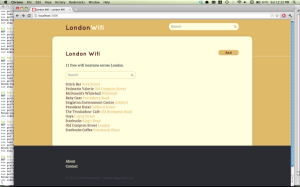Bending back the pins on an IDE hard drive and hoping they don’t snap off …
CoffeeScript Web App Framework
I’ve been working on a CoffeeScript web app in RailwayJS which is a rails-alike framework for nodejs built on top of Express.
One cool thing about RailwayJS is that you can write most of your code (not views?) in CoffeeScript instead of JavaScript. The generators, etc. will do the right thing if you give them the --coffee switch.
RailwayJS also has ORM with MongoDB and localization baked in.
#!/usr/bin/env coffee
app = module.exports = require('railway').createServer()
if not module.parent
port = process.env.PORT or 3000
app.listen port
console.log "Railway server listening on port %d within %s environment", port, app.settings.env

History (Again)
[bakert@fenchurch ~]$ history | awk '{a[$2]++}END{for(i in a){print a[i] " " i}}' | sort -rn | head
24899 git
9575 vi
7366 cd
3929 ls
2517 php
2162 mate
2125 rsync
2022 cat
1950 ssh
1938 make
Compare to four years ago. New: git, php, mate, rsync, cat, make. Climbers: ls. Same: cd, ssh. Fallers: vi. Old: u, ruby, svn, td, mysql, gd.
Newlines at the end of files
For
- If you cat a file without a trailing newline your prompt may appear at the end of the output instead of flush left.
- Some C++ compilers complain when there is no trailing newline.
- Each line in the file ends in a newline.
wc -lreports an incorrect result if it is missing- More reasons
Against
- git considers a trailing newline a whitespace error.
- Trailing whitespace is easily lost when, for example, exchanging patches via email.
- A newline after a closing “?>” in PHP can cause problems with
header()(although closing tags are no longer required in PHP). - It uses one more byte.
You Know You Are Trying to Do Too Much in a Bash One-Liner When …
find ~/bazel/src/main/webapp/lib -type f | grep -v "lib/deps/" | grep -v "lib/ext/" | grep -v "XG_MessageCatalog_" | xargs -I{} -L1 sh -c "echo {}; phpcs -d memory_limit=1024M -p -n -s --standard=/Users/bakert/Desktop/BazelCodingStandard {}"
Edit: Better:
#!/bin/env ruby
BAZEL_HOME = '/Users/bakert/bazel'
STANDARD_PATH = '/Users/bakert/Desktop/BazelCodingStandard'
VERBOSE = false
def main
exclude_patterns = [ /XG_MessageCatalog_/, /\/lib\/deps\//, /\/lib\/ext\// ]
files = Dir.glob("#{BAZEL_HOME}/src/main/webapp/**/*").reject do |f|
exclude_patterns.any? { |p| f.match(p) } \
|| ! File.file?(f) \
|| File.extname(f) != '.php'
end
files.each do |f|
puts f if VERBOSE
print %x[phpcs -d memory_limit=1024M -n -s --standard=#{STANDARD_PATH} #{f}]
end
end
main
A Pleasing Way to Represent Ascending and Descending sort in querystring
I’ve often used sort=name_a and sort=name_d for this but I noticed that ReviewBoard uses sort=name and sort=-name.
I like it.
Transparent Overlays in iMovie ’09
Assuming you have a PNG with transparency, and an iMovie project then, in iMovie:
- iMovie, Preferences
- Check “Show Advanced Tools”
- File, Project Properties, Timing
- Set Initial Photo Placement to “Crop”
- Drag the PNG with transparency to the point you want the overlay to appear in the timeline
- From the resulting pop-up menu choose “Overlay” (for full screen) or “Picture in Picture” (for part-of-screen)
- Adjust the size and duration of your overlay
node.js on ubuntu (on linode)
I got my simple movies node.js app running through Apache using mod_proxy
$ a2enmod proxy_http $ a2enmod proxy
Configured under sites-available like so:
$ cat /etc/apache2/sites-available/movies
<VirtualHost *:80>
ServerName actualfqdnofhost.bluebones.net
ServerAlias movies.bluebones.net
ProxyPass / http://127.0.0.1:3000/
<Proxy *>
Allow from all
</Proxy>
</VirtualHost>
(This assumes that your app listens on port 3000 when running.)
Then to ensure it gets restarted when the machine does I created the following file as /etc/init/movies.conf
$ cat /etc/init/movies.conf description "movies.bluebones.net on node.js" author "bakert" start on startup stop on shutdown script export MOVIES_ROOT=/srv/movies export EXPRESS_ROOT=$MOVIES_ROOT/src/express cd $EXPRESS_ROOT && exec sudo -u www-data NODE_PATH=$NODE_PATH:/opt/local/node/lib/node_modules/ EXPRESS_ENV=production /opt/local/node/bin/node $EXPRESS_ROOT/app.js 2>&1 >>$MOVIES_ROOT/logs/node.log end script
Which also lets me stop and start my app with:
$ start movies $ stop movies
Set up an SPF Record to (theoretically) reduce the risk of your web app’s email being marked as spam
I’m setting up email sending from my domain instead of faking gmail.com because of mail delivery issues. To make this work without just going automatically to everyone’s spam folder I have set up an SPF record. I found the documentation on the web a bit dense trying to work this out so here’s a short look at what I did.
“Show Original” in gmail used to say:
Received-SPF: neutral (google.com: 74.54.101.112 is neither permitted nor denied by domain of bakert+fantasyfootball@gmail.com) client-ip=74.54.101.112; Authentication-Results: mx.google.com; spf=neutral (google.com: 74.54.101.112 is neither permitted nor denied by domain of bakert+fantasyfootball@gmail.com) smtp.mail=bakert+fantasyfootball@gmail.com
Now it says:
Received-SPF: pass (google.com: domain of admin+2@ff.bluebones.net designates 178.79.178.155 as permitted sender) client-ip=178.79.178.155; Authentication-Results: mx.google.com; spf=pass (google.com: domain of admin+2@ff.bluebones.net designates 178.79.178.155 as permitted sender) smtp.mail=admin+2@ff.bluebones.net
This means Gmail is less likely to mark email sent by my web app as spam, thanks to the SPF record I have set up.
An SPF record is implemented as a DNS TXT (as opposed to A, CNAME, etc.) record with no “name” and a value something like this:
v=spf1 a mx include:_spf.google.com ~all
Let’s break that down …
v=spf1 – this indicates that the record is an SPF v1 record.
A – this indicates that any IP address in an A record for this network is allowed to send email for this domain.
MX – this indicates that any IP address in an MX record for this network is allowed to send email for this domain.
include:_spf.google.com – this indicates that _spf.google.com is allowed to send email for this domain.
~all – this indicates that _spf.google.com is allowed to send email for this domain.
All parts of the record except v=spf1 are optional and can take a prefix of -, + or ~. If there is no prefix + is assumed. + means allowed, – means not allowed and ~ means might be allowed. all is the catch-all for anything not explicitly called out by the rule.
You might be interested in a more detailed guide to SPF record syntax.
Setup NS Records for Subdomain
If you want to serve DNS for a subdomain while keeping most of the DNS records to do with its domain with another DNS provider you need NS records.
On the nameserver for example.com:
somesubdomain NS ns1.otherprovider.net somesubdomain NS ns2.otherprovider.net somesubdomain NS ns3.otherprovider.net somesubdomain NS ns4.otherprovider.net
On the otherprovider.net nameserver for somesubdomain.example.com you just need a “normal” A record (+CNAME/MX/whatever):
somesubdomain A 178.79.178.155
I have this setup working with everydns.net providing most of my DNS but linode providing DNS for the sites I have moved off my old providers and on to linode.
The previously wonderful everydns that served me well for many years (for nothing!) has been bought up and is going paid in less than 90 days so I’m taking this opportunity to move things around.

